
Joel Edgerton radiates energy.
In the endless days of screenings, interviews, jet lag, parties, photo calls and general craziness known as the Toronto International Film Festival, Edgerton couldn’t have slept much, though nobody would know to meet him. As I entered the interview room at Toronto’s Shangri-La hotel, Edgerton rises to his full height and greets me with a handshake. He immediately begins asking me about my trip, and about my new pair of red Kenneth Cole shoes. He squeezes and handles them, asking if they’re canvas, if they’re comfortable. I snicker and explain they gave me blisters from all the walking around the great city.
Still, I can’t help but smile.
Based on the incendiary memoir by Garrard Conley, Boy Erased recounts the story of a gay teenager–the son of a Baptist Minister–sent to Love In Action, a religious “conversion” program designed to make gay teens hetero. Oscar nominee Lucas Hedges leads the film, which also stars Edgerton, Academy Award winners Nicole Kidman and Russel Crowe, Troye Sivan (who also contributes new songs for the film) and Flea of the rock band The Red Hot Chili Peppers.
How about we take this to the next level?
Our newsletter is like a refreshing cocktail (or mocktail) of LGBTQ+ entertainment and pop culture, served up with a side of eye-candy.
So this is your second feature film. I guess the logical place to begin is how did Garrard [Conley]’s memoir come to you?
Kerry Roberts, a producer of the film, she happened to be reading it as holiday reading, even though it’s…
Heavy reading?
Yeah, well, the country is and was in a place so soon after the election, or it was around the time Trump was being elected. And the question of winding back of civil rights, the fear of the highest court in the land being populated by two conservative people—too many conservative people, and just the general kind of feeling in the air of what could happen to America. The injustice that was permeating in that conversation made her want to read something in that realm. So she wasn’t looking for a light read. She was looking, I think, to throw more wood on her fire, and her passions about what she thought was going wrong. Boy Erased came up in an internet search. She read it. She immediately was like, “I want to know if anyone has the rights to this because I think this story needs to be told in a visual form.” My agent happened to have moved to that company. They knew I was interested in true stories, in stuff that was sort of fear-based, but not a genre experience. And they thankfully sent it to me. And nothing has ever, no project has ever chosen me in the way this has. I almost resisted in the beginning.
Given the subject matter–which delves into horrors I didn’t even expect–I think any rational person would feel that way.
I read the book very quickly, I was so infuriated by what I was reading. I saw it as a story about a family that completely loved each other, but their beliefs and ideals were just in such conflict with each other. And a boy who was in the midst of it, you know, I hold so much stock in what my parents feel and believe, if they ever told me there was something wrong with me, I that would be one of the most devastating things in the world. Unless I knew there was something really wrong with me, like a drug addiction. Anyway, I just felt so much for his story and it struck such a chord with me, and I couldn’t stop thinking about it. I became so obsessed with it. And that’s why I say it chose me. Like, I don’t know if I’m the right person to make this film, but I’d love to be involved and must buy the rights because I want to be involved with it. And then no one else had bought the rights.

So did you reach out to Garrard right away?
I asked Garrard to write the screenplay, because, you know, a lot of writers are happy to turn their books into a screenplay. And he said he didn’t want it. So then I went back to Budapest after because I’d flown to New York to meet him. And I kept thinking about it. I had three weeks off from shooting Red Sparrow, and I thought I’d just write a couple of scenes. There’s no harm in that—just a few scenes. And I wrote the scene of him coming out to his dad and mum, and I wrote his abuse scene in college, and another scene from further in the film. And within weeks, I’d filled in all the gaps and I sent it to him. And obviously, it was a mess, but I’d done it. And I now was like…I have to make the movie.
I loved your last film, The Gift. I thought it was a fantastic debut. They’re both about pariahs. They’re both about hypocrisy. They’re both about people that seem like a freak, but ultimately they’re products of their environment. Jarred, the Garrard Conley character and Gordo [Edgerton’s character in The Gift] are both blamed for something they didn’t really do. What do you think draws you to stories about these kinds of outcasts?
I’ve written a handful of movies. The ones I’ve written on my own that come from me or come from my own twisted mind like The Gift or the movie Felony that I wrote, or The Square, that I wrote for my brother, always involve a character who’s done something really wrong and finds their way to correct it. I understand human beings are human, and have foibles, that we make mistakes. I’m not focused on the mistake so much as I’m focused on how you rectify that mistake, or whether you are willing to. So it’s not so much what you do, it’s what you do next that defines a character. And in The Gift, that character is Jason Bateman’s character. He’s wrestling with the guilt of something, and his inability to acknowledge it.
Related: The trailer for conversion therapy film “Boy Erased” is here and we’re already getting Oscar vibes
In this, that’s very much the father and the mother. Jarred’s a good character, he’s the one without all the information that gets pushed around by everybody else’s desires. He’s the victim. Hershel, the real father, and Martha, the real mother—Nancy and Marshall in the film—are people who come to realize perhaps they made a mistake, but they rectify it, or they’re willing to get there by different means. Movies have such a—someone once told me no matter how quirky or liberal-minded you are as a person when you sit in a cinema, you suddenly have an extremely defined moral compass, more than you have when you’re walking around on the street. Certain people do things, and they deserve punishment, but there’s a reward in your heart for [people] who redefine their whole ideology. That’s the hope this film makes: Any parents out there who transforms to into a mouse to a lion, to have a voice, to protect, to understand and accept.

I saw the new Halloween movie the same day I saw Boy Erased, and your movie scared me a lot more. There are some shocking scenes of violence in this movie. I want to know, how do you prime your actors for that? You’re dealing with some veteran actors, obviously like Russell and Nicole, and some, like Troye, who aren’t.
Look, it’s not how I prime the actors, it’s how I prime myself. I was talking about the abuse scene the other day at a Q&A, and I found myself getting emotional just talking about it. I’m an actor, and it’s funny, I’m an actor, and I’m like “don’t tiptoe around me.” If I sign on to a project, I’m going to steel myself for what I have to do, whatever that is. So you don’t have to molly-coddle me. But at the same time, the first sex scene that I’ve ever shot [as director] being an abuse scene was very tough. Initially, we were shooting the masters [the wide shot which shows the full scope of the camera], the main take: The master pulls out, and then it pushes back in. And of course, almost as shocking as the rape itself is what happens after. That he became in a position where he consoled the person abusing him.
Which renders the scene all the more disturbing, and disgusting.
That says a lot about Garrard and his empathetic point of view, or why he has empathy for Vic Sykes or John Smid [the real-life head of Love in Action], his therapist. He seems to understand everybody and why they do what they do. The real, real villain of the piece is his college friend. There’s no excusing that. But you prime your actors just by giving them what they need. Each relationship with an actor needs to be unique to what that actor needs. And those guys [Lucas Hedges and Joel Alwyn] were just so game to make it work, so willing to go there. I have to say about the film: it’s interesting, that’s an extremely violent scene. The fake funeral is horrific. And by the way, Flea [who plays “masculinity expert” Brandon] was great.
He’s a fantastic character actor. Thank you for realizing.
There were so many more things that his character was responsible for, like holding little workshops on how to change your oil in your car, how to change a tire, it’s about enforcing gender stereotypes. John said it was to put people out of their comfort zone and to face fears, but really, it was to reinforce stereotypes.
Gender roles, right.
So if you’re a man, you should be able to play sports. When your car breaks down, once you get your girlfriend and are out of LIA, you should know how to fix a tire. And girls, you gotta love makeup and dresses. So these shocking tricks they would do—it’s laughable, and it would be funny if it weren’t true.
I still have to snicker at some of the absurdity of it. I’ll also let you know I have the tie that you wear in your first scene. I’m going to be wearing it a lot less.
There’s a lot of stuff in the film that I’m really proud of for just having rendered it honest to what the “therapy” was, because as much as people say, “I expected so much more torture and violence.” I’m going, “Well, they do exist in some therapies, but not in Garrard’s.” This story allows for a lot more redemption. People thought they were truly trying to help him. To me, the subtlety of that, the margin in which the therapies exist is kind of more terrifying, because of that safety, or a well-intentioned way to help…
So much of the tragedy in this is good intentions gone awry.
Yes. And it also allows that space for these things to continue to operate. If there was a pile of bloody bodies outside the back of every therapy unit, we wouldn’t even be having this conversation. We wouldn’t be making this movie. It would be done. And we’re making this movie at a time when there’s still a shot at dismantling things, you know? It’s in the midst of attempts. You know, One Flew Over the Cuckoo’s Nest is one of my favorite movies, but it was made five years after the lobotomy bans, whereas the book was written five years before. The ideas of therapy within this movie are seeds that are planted that lead to things like suicide. Like, you go, “oh, he left five years ago, and then he killed himself. That’s not really the fault of the therapy.” And you go, “Wait, that’s totally the fault of the therapy.”

You mentioned Vic [leader of Love In Action], real name John Smid. Did you have contact with him? Did you meet with him for the film?
Yeah.
Really?!
My assistant David–David’s also a co-producer–and I. David’s also behind the podcast that he and Garrard are making, and he plays my assistant, Michael, in the film. David’s been an incredible person in my life for the past eight years. And I have to say on a subtle note, a big part of my ability to connect with the book, knowing that he and his husband, Brian, are probably the closest people in my life that have given me such an indication and such insight into the LGBTQ community. David’s been an incredible resource just like Garrard has. So David & I flew to Texas, and went to a Cracker Barrel…
[Laughter]
Oh god.
And at Cracker Barrel, so the production was wonderful. They gave us a list of businesses not to patronize. And Cracker Barrel is one of the worst. But we had to go meet John Smid at the Cracker Barrel where he’s on a little trip to the city to find furniture to restore. The guy who once restored…you know…
Straightness?
Yeah, he’s now restoring furniture. And look, to John’s defense, there’s a certain amount of advocacy he’s trying to do. He’s turned his back on the therapy, he’s looking to make YouTube videos about it, and to write posts on Facebook about it…apologies. You can’t get the time machine and rectify anything. So for example, the response to one Facebook apology from one ex-client was a list of names, people who are no longer walking on this Earth because they went to Love in Action. So John has a lot of pain. I don’t know that his brain can really figure out how to daily focus on the tasks that he put people through. But yes, I met him. And the one thing I asked his permission of, the one thing I felt I had to include was the Cameron storyline. It had been a practice at Love in Action, but it’s in one page that it’s mentioned that they used to hold fake funerals. And I just felt like suicide was such a big part of all the research that I did, that I had to include it in the movie. I had one shot. And John said, “I feel like you have to” and told me some stories about people he’d mentored who are no longer with us.
So before we wrap up, I have to say a friend of mine is a die-hard Star Wars fan, and when he found out that I was meeting you, he said, “You’ve got to ask Joel about Star Wars.”
Yeah, what’s he want to know?

I dunno if you’ll ever do it again?
Oh yeah, absolutely. I’ve actually been very vocal about that because I know [Disney is] doing all these new films. And I know they’ve got the murmurings of an Obi-Wan movie, and I actually said to a couple of people I have access to in that whole world.put my hand in the air, I’d totally be down. I had such a little job on the first ones, yet they had such an impact. To this day, whenever I’m on the street, even here in Toronto, whenever I sign pictures…I mean, eight out of ten pictures that I sign, of all the work I’ve done, it’s still this funny photo that I hate of myself.
Uncle Owen? For real?
Me at 26 looking so still with puppy fat.
[Laughter]
So yes, I’d love it.
Boy Erased opens nationwide in theatres November 2.




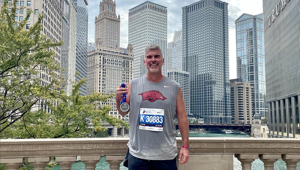


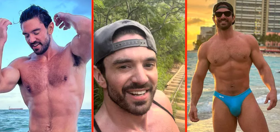



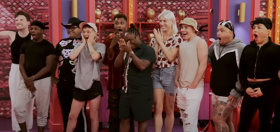


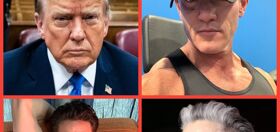



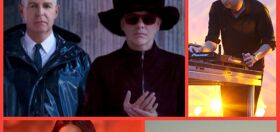


Kangol
Isn’t there another film about adolescent gay conversion therapy, The Miseducation of Cameron Post, starring Chloe Grace Moretz, that’s just appeared or about to hit the big screen? I’m not saying there can’t be more than one but it’s interesting that they’re appearing at the same time, though that’s kind of Hollywood seems to work these days.
JK 1984
That has always happened in Hollywood. Just of the top of my head here are a few examples:
Armageddon/Deep Impact
The Prestige/The Illusionist
Mission to Mars/Red Planet
Volcano/Dantes Peak
I’m sure I could think of lots more if it wasn’t a lazy Sunday morning.
jamswft
My juvenile conversion therapy at a private Christian boarding school led to juvenile human trafficking. We were beaten, starves, raped and sold to the highest bidder. I suffer with CPTSD to this day. All juvenile conversion therapy should be banned. Even in the states where there is a ban it is business as usual for religious organizations. I will be exposing all of them as I can. I have been getting kids off the streets for over 20 years. My parents put me out at age 15 for my sexuality. I know the lives ahead of these kids. I lived it. My award winning memoir Rusted Rhinestones tells some of my story. I was asked to write it after being cast on the reality show UTOPIA.